- Reference Number: HEY1015/2022
- Departments: Nutrition Support, Renal Service
- Last Updated: 1 June 2022
Name:
Date:
Dietitian:
Telephone: 01482 674707
This leaflet was created by Renal Dietitians from:
- Hull University Teaching Hospitals NHS Trust
- Leeds Teaching Hospitals NHS Trust
- York and Scarborough Teaching Hospitals NHS Trust
Diet and your kidney transplant
One of the benefits of having a kidney transplant is that you can enjoy a more varied diet. Some dietary changes may be required and your renal dietitian will guide you with this.
The aim of this diet booklet is to explain the importance of nutrition and food safety after your kidney transplant.
Immediately after your operation
- A good nutritional intake will help your recovery. Eating the right foods can help to prevent infections and heal wounds. If your appetite is poor after your operation, your dietitian can offer advice on how to improve your food intake or suggest nutritional supplement drinks to take.
- Your transplant medications may affect your blood results and you may need to alter your diet. However this is usually short term and your dietitian will guide you through any changes.
- Food safety is important to prevent any foodborne illness (food poisoning), which may result in vomiting and diarrhoea. This may cause you to become dehydrated or not absorb your transplant medications.
How do transplant medications affect my diet?
Early side effects include:
- High blood potassium level – this may occur for a short time after your transplant. If necessary, you will be advised to reduce your intake of foods high in potassium.
- Low blood phosphate level – this may occur for a short time after your transplant. If necessary, you will be advised how to increase the phosphate in your diet.
- Unstable blood glucose level – if necessary, you will be given advice to help manage this. If you have diabetes, you may also wish to discuss this with your diabetes specialist nurse or dietitian.
Longer term side effects can include:
- Weight gain – This is common, especially in the first year after your transplant. It is usually due to a combination of eating too well, lack of exercise or activity and the effect of some tablets, such as steroids. Being overweight can lead to high blood pressure and cholesterol levels which, can lead to diabetes and heart disease. Keeping a healthy weight can help maintain the lifespan of your kidney transplant.
Food Safety
Immediately after your transplant surgery, you will start taking immunosuppressive medications to prevent your body from rejecting the new kidney. These medications weaken your body’s ability to fight infection, including those that can come from food. It is important to prevent foodborne illness, as during episodes of vomiting and diarrhoea you can become dehydrated and not absorb your medications.
While food safety is especially important during the first 6 months after your transplant surgery, you should continue to follow food safety advice for the lifetime of your transplant.
Minimise the Risk of Getting Foodborne Illness – by following the 4 C’s
- Wash your hands properly and keep them clean especially before handling food, preparing food and before eating. Keep work tops, chopping boards and utensils clean at all times. Wash and change dish cloths and tea towels regularly.
- Cook food thoroughly (to 75°C) or follow the manufacturer’s cooking instructions on food packaging. Eat cooked food within an hour of making. Do not eat food that is past its ‘use by’ date and discard food that is out of date.
- Chill food quickly (cool cooked food at room temperature and then place in the fridge within 1-2 hours). Store leftovers in the fridge in sealed containers and eat within 2 days. Keep fridges at the correct temperature (between 0-5°C) and freezers at -18°C. Defrost foods fully in the fridge where possible.
- Avoid cross-contamination, this is most likely to happen when raw food touches or drips onto ready- to-eat food, equipment or surfaces. Store raw foods at the bottom of the fridge and ready-to-eat foods above. Use different chopping boards and utensils for raw and ready-to-eat foods.
High risk foods
After your transplant you should avoid foods which put you at greater risk of a foodborne illness. The following tables list the high risk foods to avoid and safer alternatives to choose instead.
Meat and meat-free foods
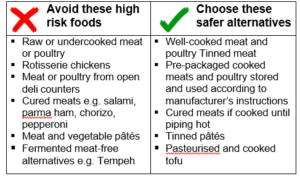
Fish
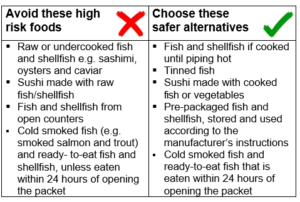
Eggs
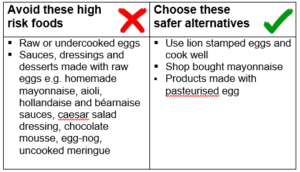
Dairy and plant-based alternatives
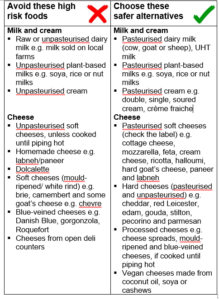
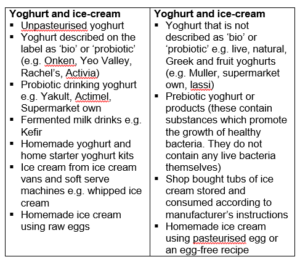
Fruit and vegetables
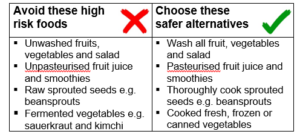
Miscellaneous
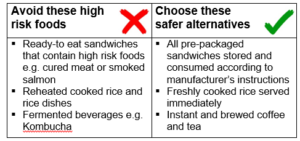
Eating out and takeaways
Eating out and takeaway meals should be avoided for the first 6-8 weeks after your transplant. After this time, eating out can be enjoyed if following food safety advice.
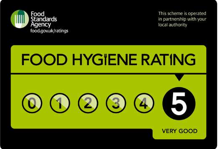
Choose restaurants with a high, or level 5, food hygiene rating and decide on menu options using the guidance in this booklet. Caution should be taken when eating foods from buffets, street vendors, deli counters and salad bars due to the risk of cross-contamination.
In the long term
Weight gain is common after a transplant. This is due to relaxed dietary restrictions and a general sense of well-being, as well as potentially steroid-induced hunger. Most weight gain has been found to occur during the first 6-12 months after transplantation. Keeping a healthy weight can help maintain the lifespan of your kidney transplant.
A healthy diet includes eating foods which are low in fat, sugar, salt and high in fibre. In particular, continue to be careful with the amount of salt you eat to help manage your blood pressure. Including enough calcium in your diet is also important to keep your bones healthy and reduce the risk of osteoporosis. Your dietitian will give you advice on this if your intake of calcium is low.
A few months after your transplant, usually 6 months, your dietitian may discuss healthy eating with you in more detail.
Frequently Asked Questions
Do I need to be careful with my diet if I travel abroad?
It is important to take extra care following food safety advice when you travel abroad. Please discuss this with your dietitian before travelling to help reduce the risk of a foodborne illness.
I’ve heard that I shouldn’t drink bottled water, is this true?
Bacteria can be found in some bottled waters so it is recommended to avoid non-carbonated (still) bottled and mineral water. Carbonated (fizzy) bottled water and treated tap water are safer alternatives. If you travel abroad you should avoid tap water if it is unsafe.
Why should I not eat reheated rice?
Uncooked rice can contain spores of bacteria (Bacillus cereus) that can cause food poisoning. The spores can survive even when rice is cooked. If cooked rice is left standing at room temperature, the spores can grow into bacteria. These bacteria will multiply and may produce toxins (poisons) that cause vomiting or diarrhoea. It is best to eat rice immediately after cooking to reduce the risk of the spores becoming bacteria.
Why should I avoid certain yoghurts?
Bacteria naturally found in yoghurt are destroyed by the acidic nature of the stomach. However, the extra probiotic bacteria added to ‘probiotic’ or ‘bio’ yoghurts may survive. It is therefore best to avoid ‘probiotic’ and ‘bio’ yoghurts to reduce the risk of illness. Plain, natural, Greek, fruit and live yoghurts are safer alternatives.
NOTES:
|
|
This leaflet has been produced by the Hull University Teaching Hospitals NHS Trust and is available as a download:
Download the “Diet and your kidney transplant” leaflet

